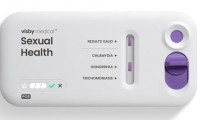-
Astellas’s CAR Tech Deals Speed Up Its Pursuit of In Vivo Cancer Cell Therapies
- Source: drugdu
- 133
- February 20, 2024
-
MHRA launches second phase of genetic biobank for stroke prevention medicines
- Source: drugdu
- 91
- February 20, 2024
-
PlaqueTec and Babraham Institute partner for treatment of coronary heart disease
- Source: drugdu
- 126
- February 18, 2024
-
Smiths Medical recalls syringe pumps for software malfunction
- Source: drugdu
- 133
- February 17, 2024
-
Smiths Medical recalls syringe pumps for software malfunction
- Source: drugdu
- 185
- February 17, 2024
-
Portable Rapid PCR Diagnostic to Detect Gonorrhea and Antibiotic Susceptibility
- Source: drugdu
- 148
- February 16, 2024
-
New Stool Test for Detecting Colorectal Cancer Could Reduce Unnecessary Colonoscopies
- Source: https://www.labmedica.com/molecular-diagnostics/articles/294800242/new-stool-test-for-detecting-colorectal-cancer-could-reduce-unnecessary-colonoscopies.html
- 185
- February 15, 2024
-
【EXPERT Q&A】When exporting Class I medical devices, should they be declared for non-medical or medical use?
- Source: drugdu
- 149
- February 15, 2024
-
Electrochemical Sensors with Next-Generation Coating Advances Precision Diagnostics at POC
- Source: https://www.labmedica.com/clinical-chemistry/articles/294800220/electrochemical-sensors-with-next-generation-coating-advances-precision-diagnostics-at-poc.html
- 120
- February 14, 2024
your submission has already been received.
OK
Subscribe
Please enter a valid Email address!
Submit
The most relevant industry news & insight will be sent to you every two weeks.













